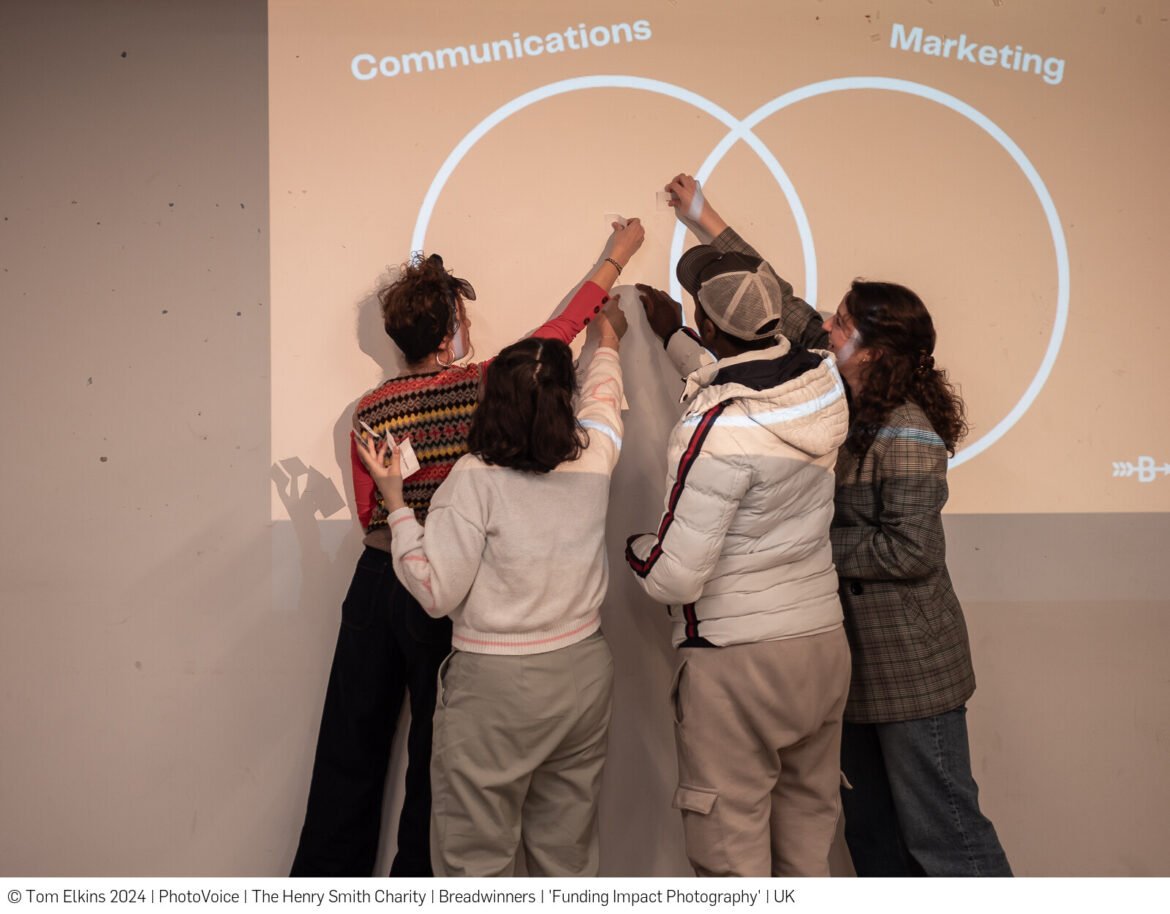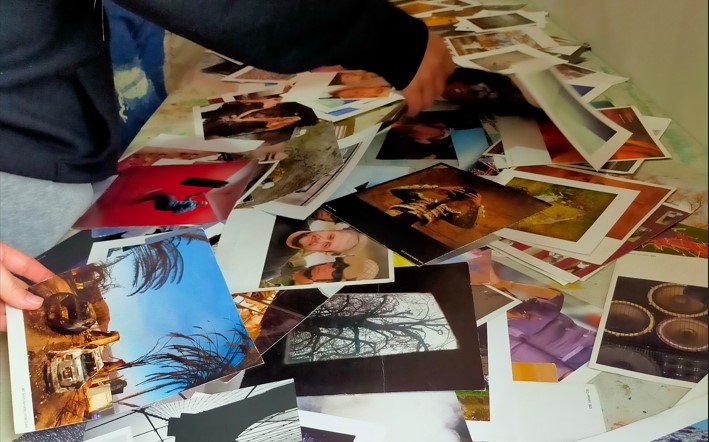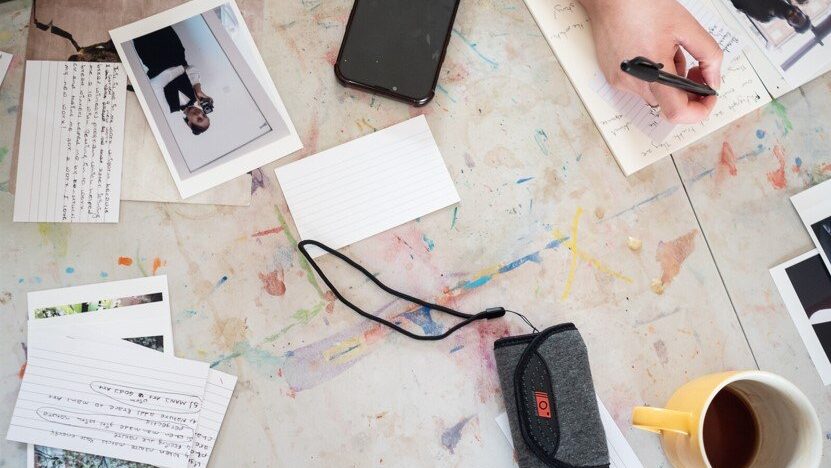As part of our ongoing commitment to amplifying the voices of our grant holders, we launched a new pilot project in collaboration with PhotoVoice, a social enterprise specialising in photographic storytelling.
We ran a two-day workshop where the staff and young people supported by one of our grant holders, Breadwinners, learned digital storytelling techniques and had the chance to tell their own stories through photography, in their own way. We spoke to Martha and Josie, two key members of staff at Breadwinners, about how they support young refugees and asylum seekers to develop stronger skill sets, more confidence and a safe, welcoming community.
Hi, it’s great to meet you both. Please could you introduce yourselves, and tell us about your respective roles at Breadwinners?
Josie: I’m Josie, and I run the Risers programme at Breadwinners, our first entry programme for 16 to 24-year-olds. We help them find their first work experience in the UK and then go on into work. We do this through our three ‘pillars’. One is volunteer mentoring. Our second pillar is training. And then there’s the work experience itself: participants work on our bread market stalls all around London and Brighton, learning skills and developing their confidence.
Martha: I run our second programme, a progression from the Risers programme. We call it the Breadwinners programme, which is where we employ programme participants as market stall managers. It’s a six-month programme and we have fewer people taking part because it’s just one manager per market. My other role is as the Breadwinners Communications Officer, so I run the social media and our website, newsletter and campaigns.
How did you come to be involved with Breadwinners? Was there something in particular that stood out about Breadwinners, an ethos that you liked?
Josie: I wanted to work with the participants. I didn’t want to be in a role where I didn’t interact with the community. I think the vibe that Martin brings is great – he’s our Charity Director. There are respectful barriers in place but we really want to create a community and make everybody feel comfortable once they walk into the space.

Martha: I joined because of the positive attitude that Breadwinners has, and the community aspect. It’s a really innovative way of thinking about employability in the refugee sector. It’s interesting and creative and I like that it’s all about community, fun and creating a safe space where young people feel that they’re part of things – which they are.
Breadwinners seems to be providing a springboard to support young asylum seekers and refugees into the next phase of their lives, and providing the next level of support that the initial, more urgent support services might not always cover.
Martha: Definitely. Once you’re part of Breadwinners, you stay part of it! For example, the Photographic Storytelling sessions we’ve been running with you at The Henry Smith Charity – all the participants have been part of our programmes at some point but are not necessarily currently enrolled. Some people come back years later and stay involved by attending our community events, for example. They’ve joined this community – it’s not just about taking part in a two or six-month programme.
[/et_pb_text]
“One of the Breadwinners has just been offered a job as a healthcare assistant, which is fantastic, and they are only two and a half months into the programme”
What difference do you think Breadwinners makes, compared to other available services and support? In other words, what difference do you think Breadwinners makes to the young people involved in the programmes that they perhaps don’t experience elsewhere?
Martha: Employability is a really fundamental thing that people need! And it’s not just employability. It’s about community, mental health and other things. It’s such an important part of being able to move on.
Josie: There are a lot of great charities that do really good work along these lines, but I’m always quite surprised about how people respond to us. We are often the first type of engagement the young people have with a programme focused on employability and self-actualisation. One of the participants told me that it’s such a good first step because there’s a low entry level. All we need is for participants to have a very basic level of English to join in. The confidence that grows throughout the programme, the way their English improves and the other opportunities we connect them to: it’s such a springboard to other opportunities. I can’t believe the changes.
What are the most common kinds of outcomes you typically see from participants after completing a programme?
Martha: We have an ‘Outcomes Star’ methodology that tracks how participants want to progress. It’s as much for them as it is for us, but it’s also a way for us to record how we’re supporting people. The five points of the star are: Employability and Training, Communication, Community Engagement, Life Goals and Wellbeing. Employability and wellbeing are the two we focus on more than anything. One of the big goals with the Risers programme is to make sure participants sign up for three other opportunities before they finish.
With the Breadwinners programme, the outcomes are slightly different because participants have the right to work. So ideally, a Breadwinner would be leaving with a new job lined up, or having already started work. Some participants finish the programme early: one of the Breadwinners has just been offered a job as a healthcare assistant, which is fantastic, and they are only two and a half months into the programme. Just having that structured programme and first job on the CV alongside the training really can give participants a boost. As well as the more concrete outcomes, there’s also the benefit of simply feeling better in themselves and having more of a sense of community. We’re helping people integrate beyond Breadwinners. We often help them sign up to lessons or other social or activity groups.
What are some of the types of employment Breadwinners graduates go on to do?
Martha: Some go on to do similar work, like customer service, and some go on to cafes. We have a partnership with the bakery that supplies our baked goods for sale in the market and with some other organisations; they take people on from Breadwinners sometimes. One participant went into engineering work experience through their school because they want to study it at university. The more we network and partner with local organisations, the clearer the employability pathways become.
“It’s a really innovative way of thinking about employability in the refugee sector… It’s interesting and creative…it’s all about community, fun and creating a safe space where young people feel that they’re part of things – which they are.”
 Copyright © E Rowland 2024[/caption]
Copyright © E Rowland 2024[/caption]
What difference does the funding The Henry Smith Charity has provided make to Breadwinners, that the organisation wouldn’t otherwise be able to achieve?
Martha: We don’t usually receive funding for our core activities. Normally, our funding will go towards a specific market or aspect of a programme. Core funding like this is really important because programmes can’t run without our jobs – so that makes a huge difference. Also, because it’s funding for three years, it means that we can plan to recruit more young people. It gives us the security to know that we can factor this into our target numbers and perhaps even open more markets.
Quite a big focus at Breadwinners is making sure that there are team-building activities for staff as well as for the young people, so that we’re all motivated. We are now able to have coaching sessions as staff members so that our team can develop and come to work as our best selves. This makes the whole organisation more sustainable and resilient. It is allowing us to mature the organisation through investing in staff development.
We’re also really excited about workshops like the photographic storytelling sessions you’ve organised with PhotoVoice. It’s brilliant that The Henry Smith Charity is interested in forming a relationship with us instead of just being an anonymous funder. It allows us to build capacity in the organisation and make it more participant-led. It all goes back to that idea of sustainability, making this long-term.
Josie: It’s hard to explain how much core funding helps. It’s the difference between living pay check to pay check and having the knowledge that we have the funding to run long-term programmes – we can actually make much more of them. Also, if the workforce is motivated, they probably have double to give to the organisation. They have the care, compassion and extra energy that it takes. The impact you can have just by increasing wellbeing a little bit is incredible.
Do you think funders should be doing more of this kind of work, such as producing partnership-based interactive workshops and activities alongside the core funding?
Martha: Yes. This feels really fantastic and exciting to me. As far as I’m aware, we haven’t done anything like this before. It’s great for the young people to gain experience in different areas, ones that we wouldn’t have been able to put on for them otherwise. We wouldn’t be able to put on this workshop without The Henry Smith Charity suggesting, funding and organising it. It’s great to have The Henry Smith Charity’s input and suggestions of things you think would benefit us. That type of relationship is more interesting and sustainable.
What difference does the core funding make for the beneficiaries, the young people, that you’re working with?
Martha: In Breadwinners, a huge part of the work we do with the young people is the training sessions. Having the energy as staff members to be able to bring enthusiasm and happiness and a good vibe to the training sessions, which is what we can bring if we’re supported, makes or breaks the programme to be honest. Participants can’t engage otherwise.
Do you think it makes a difference to engagement rates and continuity rates with the young people as well?
Martha: Yes. I think they want to come because the sessions are fun. We take on their feedback and ask them what they thought of the session, and to rate it. We’re always trying to make the sessions the best they can be, so that the young people can learn important skills like CV writing, but more importantly, we want them to keep coming back and engaging because they enjoy the sessions. We recently had a graduation ceremony for the last cohort of Risers. A few participants were saying “I don’t know what I’m going to do on Wednesdays now…”. That’s our usual training evening.
What is the best thing about working at Breadwinners?
Josie: Engaging with the community, the amount of the world that’s in the room is incredible, and I feel privileged to be able to have access to that.
Martha: I would agree. A huge part of what I love about my job is the interactions with the young people and these community sessions. They give me that real love for the job and that in turn gives me the drive and energy to do all the admin surrounding it! Interacting with all these amazing people is what makes it special to work here.
To learn more about the impact Breadwinners is having, read their latest Impact Report via the link below.
Author: Ellen Rowland, Communications Manager
Main Image: © Copyright Tom Elkins 2024
